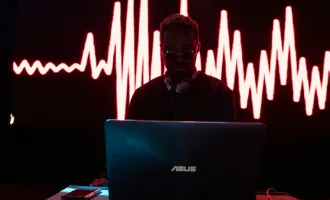
Beyond Science: Speaking Truth to Power
Science has always been politicized. Whether it comes to research funding or classroom curriculum, political values and agendas continuously shape the scientific endeavor and its development.
However, under the current political climate, science is being directly threatened and outspokenly admonished. From the deletion of White House pages on climate change (archived here) to threats on NASA’s Earth Science Division funding, concerns about the growing politicization of science are rapidly resurfacing.
Earlier this March, a group of scientists, doctors, researchers, and students gathered in the William Oberndorf Auditorium at the UCSF Mission Bay for an afternoon symposium to discuss the risks and responsibilities of scientists in these unsettling times. The panel included a wide range of researchers, scientists, and healthcare professionals who have brought light to highly politicized issues such as the sugar and tobacco industries, climate change and public health, and HIV/AIDS research involving humanized mice.
“UCSF has a long history of playing a role in important debates and issues of our time,” said Diana Laird, who moderated the panel alongside Tracey Woodruff, both faculty members of the UCSF Department of Obstetrics, Gynecology, and Reproductive Sciences. “And we are here today to come together and think about our responsibilities in sharing our science,” said Woodruff.
Together, Laird and Woodruff founded and co-lead the UCSF Environmental Health Initiative, a university-wide undertaking to integrate efforts of all UCSF schools and departments to incorporate environmental health into medical professional education, research and clinical care. Both Laird and Woodruff are researchers working to bridge the gap between environmental health and academia.
According to Laird and Woodruff, the event was organized to help eliminate the conceptions and fears about what it is like to speak up about your science. In his opening remarks, Dan Lowenstein, UCSF Executive Vice Chancellor and Provost, said, “…I don’t think there has been a more important time where the generation of truth, of trying to get as close to the truth, has become as important as the times we are living in right now.”
Censoring Scientists
Since the taking of office, the Trump administration has initiated a full set of measures to censor scientists and the progress that has been advanced due to the collaborative work among scientists, policymakers, and people around the world. Just this week, the Trump administration visited the U.S. Environmental Protection Agency (EPA) headquarters in Washington D.C. to pass forward an executive order to strengthen domestic energy independence and reverse the Obama administration’s Clean Power Plan, “a historic and important step in reducing carbon pollution from power plants that takes real action on climate change.”
Although the science behind climate change is clear, it has been morphed into a highly partisan issue that is typically divided by political party lines. Issues like climate change are not intrinsically political in any way, shape, or form.
UCSF Science Advocates
Despite the mass politicization of scientific truths, Keith Yamamoto, UCSF Vice Chancellor for Research and the Executive Vice Dean of the School of Medicine, was among the UCSF scientist-advocates who are working to debunk the political forces that continuously vilify the scientific endeavor.
“We have been schooled not to get involved with the political. But, we must not be silenced about the importance of science because it has somehow become politicized,” Yamamoto stressed.
Congresswoman Jackie Speier who proudly represents San Francisco and the Peninsula, emphasized that, “fear is not an option. It is really important for us to be strong and clear and purposeful. We must bring truth to power... The fear and ignorance towards scientific discovery are real, especially in Congress,” Speier said. “Not a week goes that I have a colleague who is denying climate change.”
This clear opposition makes it all the more critical for collaborative partnerships among policymakers and scientists that work to gain political traction. Along with Speier, the panelists Stanton Glantz, Director of the UCSF Center for Tobacco Control Research and Education, Cristin Kearns, a postdoctoral fellow in the UCSF School of Medicine, Mike McCune, Chief of the UCSF Division of Experimental Medicine, and Linda Rudolph, Director of the Center for Climate Change and Health at the Public Health Institute (PHI), have all dived into the world of science advocacy, eliciting much-needed changes to issues that are viewed as “too controversial” and political.
How to Be an Advocate: Let Science Lead the Way
As a scientist, there is often a fine line between being an advocate and being “biased.” For nearly 40 years, Glantz has been instrumental in researching the health impacts of tobacco and publicizing the corruption of the industry.
“I want to address this question about advocacy. I get attacked all of the time for being an advocate. And I am. I admit it. I am proud of it,” Glantz said.
Glantz then addressed the questions that are often asked when discussing the complex relationship between science and advocacy. Should science drive the advocacy? Or should the advocacy drive the science? According to Glantz, there are two different ways to be an advocate.
“In my eyes, the science should drive the advocacy. If you know something, learn something, you have an ethical obligation to tell people about it in terms they can understand,” Glantz said. “It is not any different from taking what you learn in the lab to improve the care of a sick patient and improve the quality of care.”
On the other hand, “when the advocacy is designed to reach a predetermined conclusion, that is what the bad guys do.” And this is exactly what is the tobacco companies do, this is exactly what global warming deniers do, and this is exactly what the sugar industry does.
Similar to that of Glantz’s work on tobacco industry, Cristin Kearns has demonstrated “the complexity of the sugar industry strategy.”
“There is nothing that the food industry can throw at me that Stan has not already seen,” Kearns said.
But, it can be very challenging to remain steadfast when fighting these battles. Since the 1980s, Mike McCune has been researching HIV to develop treatments and a future cure for the disease. In order to conduct this research, McCune developed hematopoietic stem cell–based gene therapies for HIV disease which involves mice with fetal tissue.
Due to the controversy associated with stem-cell research, McCune has faced bomb threats, has had funny boxes with strange things delivered, and has had to fortify the front entrance of his house. At one point in time, a shotgun blast went through McCune’s lab.
Despite these life-threatening situations, McCune reflected that he is very proud to look back at these 30 years now and see all that has been accomplished.
“As scary as these times are, I have not felt as energized politically since the ’60s when there was just a bunch of us young, dirty, pot-smoking, uneducated people with no clout who fought for what was right,” McCune said. “Now we are older and there are many of you that are younger that can combine forces. We won the previous one and I think we can win this one too.”
Make the Connection Between Climate Change and Public Health
Moving forward in these uncertain times, it is all the more important for science-advocates to make connections between the existing gaps that separate interconnected issues such as climate change and public health.
As a public health practitioner, Linda Rudolph, has been facilitating conversations about the relationship between climate change and public health. Rudolph first became involved in climate change work while serving as the Public Health Director for the city of Berkeley.
Although Rudolph has spent many years in the public health field, she “never gave given climate change more than two thoughts.” That was until the Mayor of Berkeley asked Rudolph to speak about climate change at a public forum. Two things really struck Rudolph when she began to conduct more in-depth research on climate change.
“I had this ‘oh my god’ reaction…this is the public health challenge of the century,” Rudolph said. “Climate change is literally an existential threat to humans. It threatens our water, air, our food, security, our health.”
“Why is it that we as a community are not talking about this?” Rudolph asked. “When we talk about AIDS, we talk about sex. When we talk about racial disparities, we talk about race, even though that is an uncomfortable topic. Why is it that climate change is this unmentionable topic?”
To find an answer to this question, Rudolph interviewed health professionals to find out what they know about climate change and why they aren’t talking to their patients about it when it is often relevant. From a lack of information in health curricula to the politics of climate change, Rudolph found that there are a number of reasons why physicians do not discuss this issue.
According to Rudolph, even when physicians feel informed, they may resistant to discussing climate change because they feel that it is not a priority for their patients and the community. Furthermore, many of the health care practitioners that Rudolph spoke with stated that they did not want to discuss climate change impacts since they could not necessarily do anything about it.
On the other hand, some physicians choose not to discuss climate change because “they do not want to bring politics into what they do as a healthcare professional.” It is just too controversial to bring up.
Quoting Martin Luther King, Jr., Rudolph emphasized that “there comes a time when silence becomes betrayal.”
“I think as health care professionals that if we don’t speak up about the risks of climate change, we will have betrayed our communities and future generations,” Rudolph said.
Unless we talk about climate change, who will talk about it? Unless we talk about the sugar, tobacco, and oil industries, who will? As Rudolph pointed out there has been a very systematic, consistent, and organized effort to attack scientists and their research. Large amounts of money have been poured into denying climate change and the health impacts of sugar and tobacco.
This is not a time to be silent. As Congresswoman Jackie Speier concluded, “[we] are on the frontlines of making sure that the public health and safety of this country is protected. Do not be afraid of those who will try and suggest to you that your science is going to be politicized. [We] should wear that as a badge of honor. There is nothing more important than protecting the lives of those that are here and the lives that are not yet born. Thank you for your commitment to a better world.”
Take Action
There are multiple avenues for involvement and ways to contribute your voices to this cause. Join the Office of Sustainability and the UCSF community at the March for Science, on Earth Day, April 22. Before the March takes place, there will be a teach-in at Byers Hall from 8-10 am to discuss how to continue efforts in fighting for science.
Along with marching for science, contact your Senator and other local officials with your comments and concerns. Keep fighting and remember that we all can make a difference!
You can view the event here.


